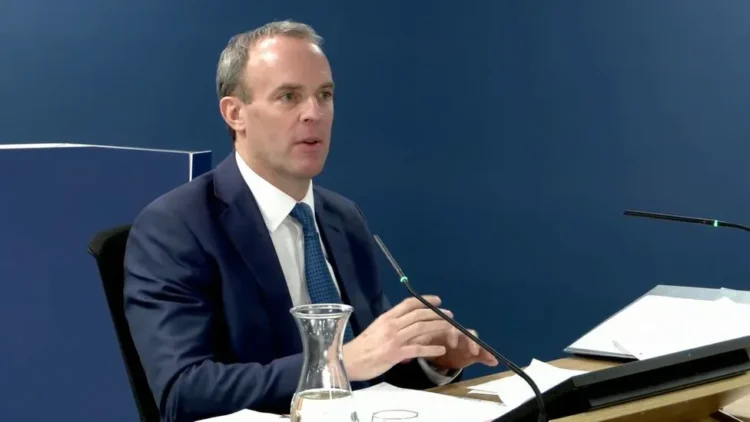By Ben Kerrigan-
Former Foreign Secretary Dominic Raab revealed that he had only five minutes’ notice to stand in for then-Prime Minister Boris Johnson during the pandemic when Johnson fell ill with Covid-19 in April 2020.
Raab’s testimony as part of the Covid inquiry addressed key aspects of the government’s response to the pandemic, including decision-making processes and the role of top officials.
Raab, speaking to the inquiry, asserted that “the best decisions” were made during the pandemic, considering the “fluid” information available at the time.
He defended the government’s actions, emphasizing the challenges posed by the rapidly evolving nature of the crisis.
Denying claims of a “puppet regime” in No 10, Raab appeared to contradict Sajid Javid, who previously worked in the government during the pandemic.
Javid, in his earlier testimony, suggested that many key decisions at the outset of the outbreak were made by Dominic Cummings, Johnson’s top aide, rather than by the Prime Minister himself.
Raab rejected the accusation that Boris Johnson was a “puppet” in Downing Street being led by Dominic Cummings when responding to questions on accusations made by Sajid Javid in which he said Mr Cummings was prime minister “in all but name”.
Mr Raab told the inquiry: “The broader question you raise about whether… Boris Johnson was a puppet, I’m afraid I don’t find that a serious allegation.
I think Boris Johnson certainly relied on his senior advisers, by the way I think you have to if you’re going to get through the work, particularly in a pandemic.”
He added: “I just don’t accept the characterization that there was some sort of puppet regime.”
The contradiction raises questions about the internal dynamics and decision-making structures within the government during the critical early stages of the pandemic.
Raab also addressed concerns about NHS capacity, acknowledging it as an issue during the pandemic. He reiterated the call for a Royal Commission to facilitate political agreement on the future funding of the health service.
In terms of of mortality rates and lockdown fatigue raised by the Inquiry lawyer, Raab said the government relied on an evidence based approach to the easing of restrictions.
Mr Raab said: “We relied on the evidence as we had it at the time. Of course we are mindful of that.”
He said Covid deaths, NHS capacity, social impacts and economic impacts were the four main issues he was focused on.
The appeal for a comprehensive review signals the recognition of systemic challenges within the healthcare system and the necessity for long-term planning to address them effectively.
Boris Johnson and Chancellor Rishi Sunak are expected to provide their own evidence to the Covid inquiry in the coming sessions.
The inquiry’s focus on key decision-makers and their actions during the pandemic aims to shed light on the government’s response, identify areas for improvement, and ensure accountability for the decisions made.




